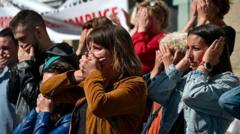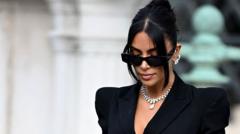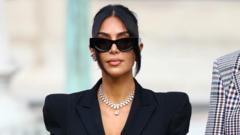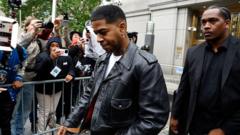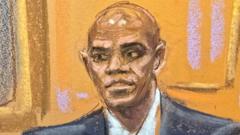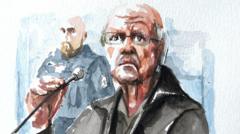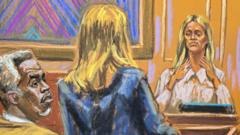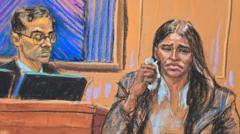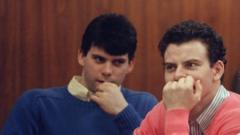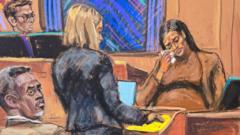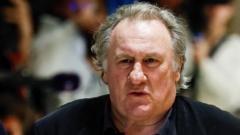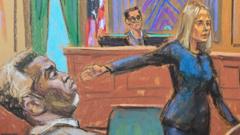Former Brazilian President Jair Bolsonaro has been charged with attempting to stage a coup against current President Luiz Inácio Lula da Silva, as determined by a Supreme Court decision. The ruling allows for Bolsonaro to stand trial alongside several former officials accused of conspiracy related to the January 8, 2023, storming of government buildings by his supporters. Bolsonaro, who maintains innocence, argues that he is being politically persecuted to obstruct his possible candidacy in the 2026 elections.
Bolsonaro Faces Trial for Alleged Coup Attempt in Brazil
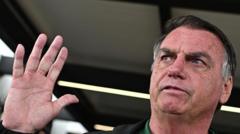
Bolsonaro Faces Trial for Alleged Coup Attempt in Brazil
Ex-President Bolsonaro denies coup involvement, claiming political persecution.
Former President Jair Bolsonaro is set to stand trial for allegedly orchestrating a coup against current President Luiz Inácio Lula da Silva, following a crucial ruling by Brazil's Supreme Court. The court's five-member panel unanimously agreed on the charges after a thorough review of the evidence. Bolsonaro, 70, fiercely denies any involvement in efforts to interrupt Lula's inauguration and insists that he is the target of political persecution focused on undermining his chances in the upcoming 2026 presidential elections.
The trial could commence as early as this year, and if convicted, Bolsonaro might face significant prison time. The judge leading the panel, Alexandre de Moraes, has suggested that Bolsonaro and seven former officials—deemed "co-conspirators"—should be tried for the events tied to the violent insurrection which occurred just days after Lula was sworn in on January 1, 2023. The individuals named include leading security and defense figures from Bolsonaro's administration.
The turmoil followed Bolsonaro's narrow electoral defeat in October 2022, after which his supporters protested outside military bases, demanding intervention to keep him in power. The unrest escalated when thousands stormed the capital's government buildings, resulting in extensive damage and over 1,500 arrests. While Bolsonaro was absent in the U.S. during the uprising, he has consistently denied any association with the rioters.
An investigation by federal police suggested the existence of a criminal organization that acted in concert to support Bolsonaro’s efforts to remain in power, leading to serious allegations laid out in an unsealed report. These included claims that Bolsonaro not only had knowledge of the conspiratorial efforts but was a primary instigator. The Attorney-General has accused him of leading this initiative, which allegedly considered extreme measures against political opponents.
Despite existing barriers, including a ban from public office until 2030 for unsubstantiated claims of fraud in Brazil's voting system, Bolsonaro has expressed intentions of contesting this prohibition. The Supreme Court's decision on the trial, however, introduces a formidable obstacle to his potential candidacy, as the case develops amidst an increasingly volatile political landscape.
The trial could commence as early as this year, and if convicted, Bolsonaro might face significant prison time. The judge leading the panel, Alexandre de Moraes, has suggested that Bolsonaro and seven former officials—deemed "co-conspirators"—should be tried for the events tied to the violent insurrection which occurred just days after Lula was sworn in on January 1, 2023. The individuals named include leading security and defense figures from Bolsonaro's administration.
The turmoil followed Bolsonaro's narrow electoral defeat in October 2022, after which his supporters protested outside military bases, demanding intervention to keep him in power. The unrest escalated when thousands stormed the capital's government buildings, resulting in extensive damage and over 1,500 arrests. While Bolsonaro was absent in the U.S. during the uprising, he has consistently denied any association with the rioters.
An investigation by federal police suggested the existence of a criminal organization that acted in concert to support Bolsonaro’s efforts to remain in power, leading to serious allegations laid out in an unsealed report. These included claims that Bolsonaro not only had knowledge of the conspiratorial efforts but was a primary instigator. The Attorney-General has accused him of leading this initiative, which allegedly considered extreme measures against political opponents.
Despite existing barriers, including a ban from public office until 2030 for unsubstantiated claims of fraud in Brazil's voting system, Bolsonaro has expressed intentions of contesting this prohibition. The Supreme Court's decision on the trial, however, introduces a formidable obstacle to his potential candidacy, as the case develops amidst an increasingly volatile political landscape.

